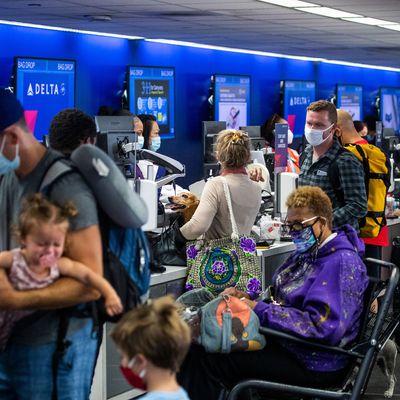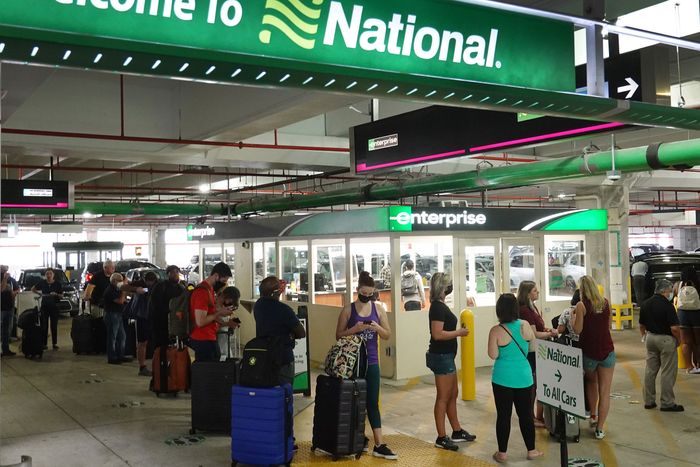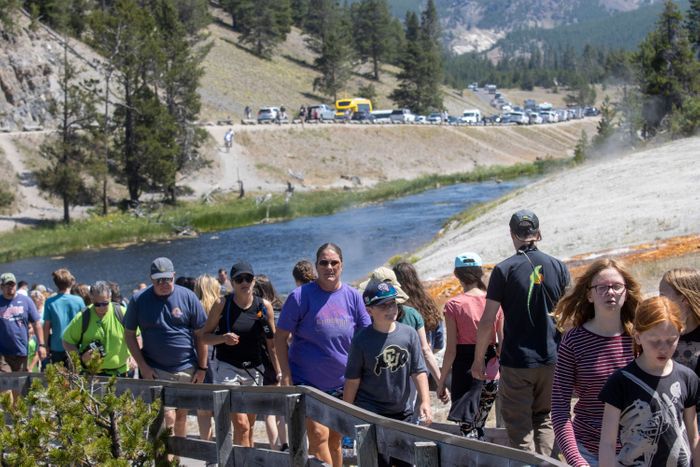
Wall Street veteran Peter Schiff knew well ahead of time that he’d need to renew his 7-year-old son’s passport for their June trip to Switzerland. Passports for minors must be renewed in person, at the passport office, but on their first attempt, the Schiffs were told it was too early. With service still limited due to the pandemic, the Stamford, Connecticut, office would only process emergency passport applications — which require appointments within 72 hours of the trip. But when Schiff, the CEO of Euro Pacific Capital, a billion-dollar money manager, tried to make an appointment, there was no longer any availability in that window at all. It wasn’t just the Stamford location that was booked up: “The only state where we could get an appointment was Hawaii,” says Schiff.
The investor began contemplating his options: Cancel and postpone his trip‚ a change he estimates would have cost him $10,000 to $20,000 extra in airfare, or fly his wife and son to Hawaii for an overnight, with at least 12 hours of travel each way. “I was looking at 10-to-12-thousand bucks to get over there, and a hotel,” he says. “The government really doesn’t care much about people,” adds Schiff, a goldbug and longtime stock-market bear who has strong opinions on bureaucracy, debt, and loose monetary policy. “It’s really inconveniencing Americans who want to travel.”
In the end, a Twitter tipster — Schiff has more than 500,000 followers on the platform — suggested he use a company called ItsEasy Passport & Visa Services. Schiff was able to get an appointment on the Upper West Side for the day prior to his flight. When he arrived, he saw a line stretching from the building down the street and around the block — but an employee told him that was the line for people without appointments, which are required. “He said none of them are going to get in, none of them,” recalls Schiff. “I heard so many horror stories.” But when he finally made it into the actual passport office, he was surprised to see it anything but crowded. “Once you get in, the place is empty,” he says. “They had a skeleton crew.”
Schiff’s experience of disorganization, chaotic delays, and huge extra expenses is increasingly typical as more Americans seek to get back out into the world and travel, after 16 months spent largely at home. Millions are finding that the travel industry isn’t yet ready for them. As of the July 4 holiday weekend, travel returned to 98 percent of pre-pandemic highs, with 5 percent more road-trippers than in 2019 and 90 percent as many airline travelers, according to AAA. “I equate what’s going on to travelers being given the keys to a terrific sports car but then being told they can drive no more than 40 miles per hour,” says Henry Harteveldt, a veteran travel-industry analyst.
After furloughing thousands of pilots during the pandemic, airlines like American and Southwest were caught flat-footed this spring, with vaccine-driven demand for planes but not enough people to fly them. Delta reports online bookings at more than 100 percent of where they were at this time in 2019, while flying nearly 20 percent fewer flights than they did then, according to Cirium, which tracks aviation data. The FAA requires retraining those out-of-work pilots before putting them back in the cockpit, but airlines could not move people through the program (especially with social-distancing mandates still in place for flight simulators) in time to meet the so-called “revenge travel” demand as summer kicked off. That’s left scores of planes still mothballed in the desert, with airlines loath to spend the tens of thousands of dollars it takes to bring each jet back into service until they’re sure they can make money if they do it. American Airlines, for one, in late June announced that it would cancel nearly 1,000 flights in July as it ran short on staff.
Given the squeeze, and planes that are flying packed to the gills, good luck if you miss a connecting flight or a storm cancels your trip: Some travelers report waiting three or four days to get another open seat to their destination. The same goes for customer service, as airlines drastically cut back those departments last year, and many of those workers have yet to return, meaning wait times for an agent can stretch to nine hours long.
In light of the frustrations, it’s perhaps no surprise that travelers are behaving badly: Airline crews have reported 3,420 incidents of “unruly” passengers so far in 2021, with more than 200 of those in the first two weeks of July alone; investigations of those cases are already at least quadruple what they were in an entire pre-pandemic year. Besides refusing to wear masks, passengers have lately punched, bitten, and headbutted flight attendants (even knocking teeth out) and fellow fliers. Earlier this month, American Airlines staff duct-taped a woman to her seat after she’d attempted to open the door of the plane mid-flight.
For those who worry about getting stuck in airports, it might be sensible to pack a sandwich, as many of the restaurants and retailers in the terminals are still shuttered. And airports could remain food deserts for a while, as many concessionnaires are refusing to open due to staffing shortages or fears of weak demand. Atlanta’s hub airport Hartsfield–Jackson has publicly tried to cajole its food concessions to open by August, promising to “hold them to their contract.”
Then there are the prices. With business travel still lagging, there are relatively few flights between, say, New York and L.A. or San Francisco, but plenty to the hottest COVID vacation destinations like Montana, Wyoming, and Florida — though fares to get there are often far above what they were pre-pandemic. The Consumer Price Index for airline fares rose nearly 25 percent in June from a year earlier — an enormous jump, historically speaking — and analysts expect even greater increases to kick in for July and August. With direct cross-country flights hard to come by, those trying to get between the East and West Coasts are seeing that an affordable ticket often requires multiple layovers and an entire day (and sometimes a night) of travel.
And as hard as it may be to get a flight, it may be even harder to rent a car once you get there. The rental-car industry off-loaded about a third of its vehicles last year as demand plummeted, and now finds it can’t buy them back fast enough — especially as a computer-chip shortage has bottlenecked car manufacturing. “You had this figuratively overnight recovery in demand, and they don’t have enough cars to meet demand in many cities,” says Harteveldt, who advises booking the car ahead of the flight, as it could persuade some travelers to swap their destination. Nick Confessore, the New York Times reporter, tweeted about his experience trying to rent a car earlier this month:
Perhaps the location with the most extreme mismatch of demand and supply is Hawaii, where the mayor of Maui County has actually pleaded with airlines to scale back incoming flights. With the University of Hawaii’s Economic Research Organization estimating that roughly 16,000 people left the islands’ workforce, perhaps for mainland jobs, during COVID, hotels are struggling to find help; in some cases, executives have reportedly been making room-service runs and busing tables. Rental homes are almost fully booked through Christmas, as are reservations at some of the most popular restaurants on the islands. “We were all lamenting, we’re getting the absolutely best requests at the highest price points, and there’s nothing to sell them,” says Debbie Misajon, founder of the Coconut Traveler, an Oahu-based agency. “We were the only exotic destination open.” With rental cars nearly impossible to find and going for hundreds of dollars per day, several of her friends have launched a new entrepreneurial venture: “They’ve bought two or three additional cars and they’re on Turo,” she says, referring to the peer-to-peer car-rental start-up.
Even in less sought-after locations on the mainland, travelers are warning that hotel accommodations aren’t what they used to be. The American Hotel & Lodging Association is forecasting that the industry will end this year still down some 500,000 jobs. The ranks of housekeeping staff have taken a particular hit, even as the need for it has grown, with many guests resorting to takeout as hotel restaurants have remained closed, says Chip Rogers, CEO of the AHLA. (Wages for those staff have risen nearly 25 percent since the beginning of the year in an attempt to lure them back, he adds.)
Some hotel guests, though, are finding that the lack of dependable services does detract from a vacation. Josh Shrader, a data analyst based outside of Atlanta, took his family of four on a five-night trip at a Marriott in Chattanooga over the July 4 holiday. He had no qualms when the hotel told him that there would be no housekeeping service in the room; he could even deal with the fact that, as the front desk informed them at check-in, only one employee worked in the hotel after the cleaning staff left for the day (meaning they’d have to retrieve anything they needed from the lobby themselves). But this became more of an annoyance when the family checked into their room only to find it entirely bereft of toilet paper. When they asked for more at the front desk, the attendant would only give them a single roll at a time. “We had to ask for TP three times while we were there,” says Shrader. Each night, the family had to bag up their own trash and take it down the hall. The one time that someone did actually come to the room was on their second-to-last night — when a family of strangers suddenly opened their door, apparently aided by a housekeeping worker who’d mistakenly swiped them in with a master key. “All that to say, it was a relatively rough trip,” says Shrader.
Of course, there’s a reason travelers are descending so heavily upon U.S. destinations. Even though many foreign countries have reopened to American vacationers (welcoming the vaccinated in particular), international travelers report a chaotic collision of canceled flights, a confusing hodgepodge of various COVID testing or vaccination requirements, and new lockdowns suddenly imposed while already abroad. (In mid-June, Lisbon, just days after reopening to American tourists, banned travel in and out of the city on weekends, temporarily trapping many visitors in place.) Then there is the possibility of testing positive for COVID-19 in a faraway place, turning a hotel room more or less into a jail cell.
Even experiences like Peter Schiff’s might remain common for a while. In a special briefing on Wednesday, the State Department acknowledged the delays in obtaining passports both in person and via mail, saying it was working to process a backlog of up to 2 million applications, but that it wouldn’t be able to move much faster for some time. “People who submit new passport applications right now will not get their new passport until well into the fall,” said Rachel Arndt, deputy assistant secretary for passport services. Those planning overseas trips who still need a passport “may need to make alternate travel plans,” she added.
The greatest, and most disappointing, irony of all: After so many months of forced captivity, if you really want a stress-free vacation, the best option might be to just stay home.
































